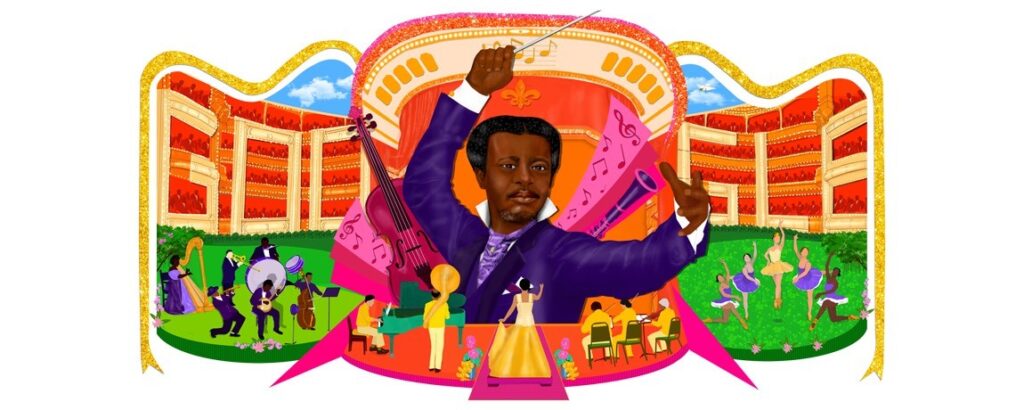Panel on Earliest Opera by a Black American, Jan. 16
By • January 9, 2025 0 1059

Sometimes it takes a while for a rare treasure to be uncovered.
In 2000, Harvard University’s Houghton Library acquired a group of opera scores from a Paris collection. A remarkable discovery occurred seven years later, when one of those 19th-century manuscripts was identified as the sole surviving copy of the earliest opera score by a Black American: Edmond Dédé’s “Morgiane, ou Le Sultan d’Ispahan,” written in 1887 and never performed.
Mezzo-soprano Givonna Joseph had been singing works by Dédé when, in 2014 — three years after she and her daughter Aria Mason founded OperaCréole — she became aware of the 550-page handwritten score, a digital copy of which was sent by Harvard to Xavier University of Louisiana in Dédé’s hometown of New Orleans. Accelerando con moto! (Italian, I know.)
Following extensive transcription and translation efforts, the securing of partners, the raising of funds — including a $410,000 Ford Foundation grant — and, eventually, casting and rehearsal, “Morgiane” will have its world premiere as part of Opera Lafayette’s 30th anniversary season. Performances will take place on Monday, Feb. 3, in Washington, D.C.; on Wednesday, Feb. 5, in New York City; and on Friday, Feb. 7, in College Park, Maryland.
The manuscript, on loan from Harvard, is on view through Feb. 28 in “Out of the Vault,” an exhibition at the Folger Shakespeare Library, 201 East Capitol St. SE. Next Thursday, Jan. 16, at 6:30 p.m., the Folger will host a free event, “Edmond Dédé and ‘Morgiane,’” at which selections from the opera will be performed and vocalist and composer Mali Irene will lead a conversation with Joseph, artistic director of OperaCréole; Nevilla E. Ottley-Adjahoe, longtime host of “Classics of Ebony” on Takoma Park’s WGTS FM; and Ersian François, general manager and associate producer at Georgetown University’s Laboratory for Global Performance and Politics.
Born on Nov. 20, 1827, a fourth-generation free person of color, Dédé trained as a violinist and performed in pit orchestras as an adult while employed at a cigar factory. Leaving the U.S. during the pre-Civil War tensions of the 1850s, in Paris he was able to study with professors from the Conservatoire and audit classes.
He made his career in Bordeaux, at first working as a répétiteur (pianist, accompanist and coach) at the Grand Théâtre. Later, he became director of Théâtre de l’Alcazar and then of Les Folies-Bordelaises, composing dozens of varied works, from songs and dance music to overtures and ballet scores. Dédé made one return visit to New Orleans, in 1893, where the Black Creole community welcomed him while facing the painful realities of Jim Crow. Returning to Paris, he died in 1903, aged 75, never having heard “Morgiane.”
Founded in D.C. in 1995 by violinist and conductor Ryan Brown, Opera Lafayette is a leading presenter of French baroque operas (and others) with a period chamber orchestra. Though French, “Morgiane” dates to a later period and is by an American composer, another first.
The production came about in conjunction with the appointment of Patrick Quigley, founder and artistic director of Miami-based vocal ensemble Seraphic Fire, as Opera Lafayette’s artistic director designate. Brown will step down as artistic director following celebratory performances in Manhattan’s St. Bartholomew’s Church on April 30 and in the Kennedy Center Terrace Theater on May 1.
Quigley, a New Orleans native who learned of the score early in 2023, will conduct the world-premiere performances of the four-act “Morgiane,” the libretto of which draws on themes from “Ali Baba and the 40 Thieves.”
The scenario: Amine (soprano Nicole Cabell) is kidnapped on her wedding day by the soldiers of the evil Sultan Kourouschah (bass Kenneth Kellogg), including his henchman Beher (bass-baritone Jonathan Woody). When Amine’s fiancé Ali (tenor Chauncey Packer), her mother Morgiane (soprano Mary Elizabeth Williams) and her father Haggi Hassan (baritone Joshua Conyers) infiltrate the palace disguised as singers, they are discovered and condemned to death. But Morgiane knows something that no one else does …
“Morgiane” will be performed at 7 p.m. (pre-show discussions at 6 p.m.) on Feb. 3 at D.C.’s Lincoln Theatre, 1215 U St. NW; on Feb. 5 at Jazz at Lincoln Center’s Frederick P. Rose Hall in Manhattan; and on Feb. 7 at Dekelboum Concert Hall at the University of Maryland’s Clarice Smith Performing Arts Center in College Park.
In addition, in partnership with the Historic New Orleans Collection, Opera Lafayette and OperaCréole will present a 90-minute excerpted production featuring the Louisiana Philharmonic Orchestra on Jan. 23 in New Orleans at the Cathedral-Basilica of St. Louis, King of France, where Dédé was baptized in January of 1828. At that performance, soprano Taylor White will appear as Amine.
Tickets to these performances are available at operalafayette.org.

